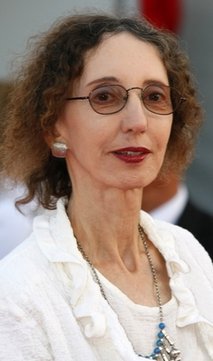
13 Feb 2011 21:32:29
Known for such novels as "Blonde" and "Them," and for dozens of other works, she had been married for 47 years when her husband, author and editor Raymond Smith, died in 2008. Oates, who seemed to turn out fiction with the ease of conversation, was at first stumped over how — or whether — to make a narrative out of her own grief.
"This wasn't anything like I would have tried with a conventional book," the author says of her memoir, "A Widow's Story."
"I was working with my journal, which I would write in every night because I couldn't sleep. It wasn't even a journal, but just pieces of paper, basically pieces of papers that happened to be lying around."
Oates, 72, is not only among the most prolific writers, but the most adventurous, willing to inhabit the minds of characters of all ages and social classes, to express the most intimate thoughts of sex and violence and despair. No matter how dark the stories of "Them" or "Blonde" or "Black Water," there is no question the author has the power and the desire to tell them.
"Novels," Oates explains in an interview from Washington, D.C., where she was traveling, "usually evolve out of `character.' Characters generate stories, and the shape of a novel is entirely imagined, but should have an aesthetic coherence." But the "characters" were now herself and her husband and she didn't want her memoir to read like a novel, a well-shaped tale. Life itself would determine how the book came out.
She began with notes from her journals, more than a year after the death of her husband, who had fallen ill and been hospitalized with pneumonia. At first, she wanted to write a "Widow's Handbook," tips for the bereaved, in a dark, but humorous tone. The book grew as she added more entries from her daily thoughts and worked in memories of her early years with Smith. She calls "A Widow's Story" an "assemblage."
"None of this was consciously planned," she says. "Usually, I have outlines for everything that I write, even short stories."
"What she wanted to do was find a way to write about what happened to her that would cause the people who read it to understand how this terrible thing is a human event we all must get through, and to use her experience on that behalf," says her friend and fellow author Richard Ford. "This is not to say this is the book's only purpose. It has literary purposes, too."
Oates' editor and close friend Daniel Halpern of Ecco Press, an imprint of HarperCollins, says the book not only reads differently from her fiction, but was different to work on. It was new territory and the material was much more sensitive and personal, with Halpern himself part of the narrative.
"This wasn't anything like I would have tried with a conventional book," the author says of her memoir, "A Widow's Story."
"I was working with my journal, which I would write in every night because I couldn't sleep. It wasn't even a journal, but just pieces of paper, basically pieces of papers that happened to be lying around."
Oates, 72, is not only among the most prolific writers, but the most adventurous, willing to inhabit the minds of characters of all ages and social classes, to express the most intimate thoughts of sex and violence and despair. No matter how dark the stories of "Them" or "Blonde" or "Black Water," there is no question the author has the power and the desire to tell them.
"Novels," Oates explains in an interview from Washington, D.C., where she was traveling, "usually evolve out of `character.' Characters generate stories, and the shape of a novel is entirely imagined, but should have an aesthetic coherence." But the "characters" were now herself and her husband and she didn't want her memoir to read like a novel, a well-shaped tale. Life itself would determine how the book came out.
She began with notes from her journals, more than a year after the death of her husband, who had fallen ill and been hospitalized with pneumonia. At first, she wanted to write a "Widow's Handbook," tips for the bereaved, in a dark, but humorous tone. The book grew as she added more entries from her daily thoughts and worked in memories of her early years with Smith. She calls "A Widow's Story" an "assemblage."
"None of this was consciously planned," she says. "Usually, I have outlines for everything that I write, even short stories."
"What she wanted to do was find a way to write about what happened to her that would cause the people who read it to understand how this terrible thing is a human event we all must get through, and to use her experience on that behalf," says her friend and fellow author Richard Ford. "This is not to say this is the book's only purpose. It has literary purposes, too."
Oates' editor and close friend Daniel Halpern of Ecco Press, an imprint of HarperCollins, says the book not only reads differently from her fiction, but was different to work on. It was new territory and the material was much more sensitive and personal, with Halpern himself part of the narrative.

